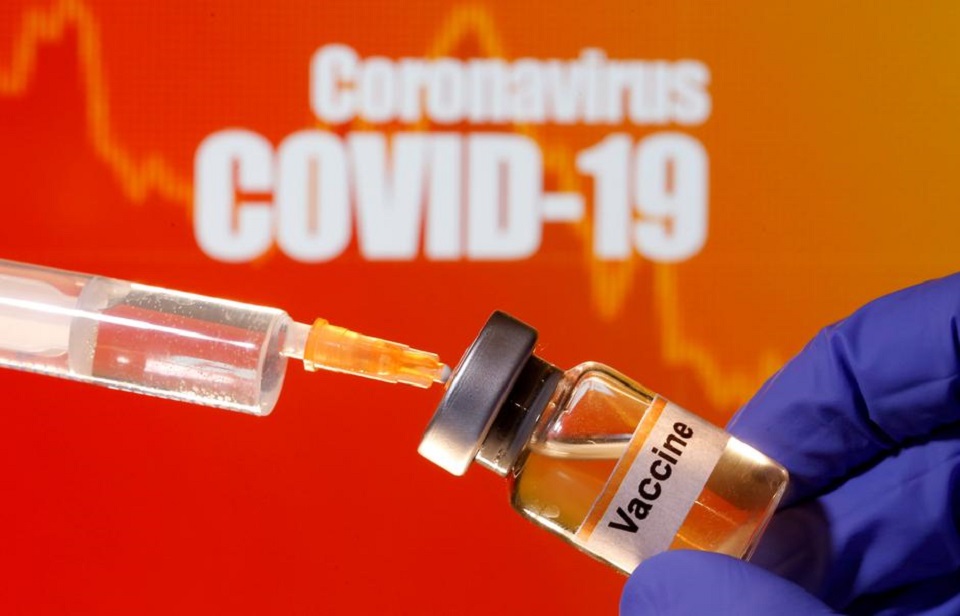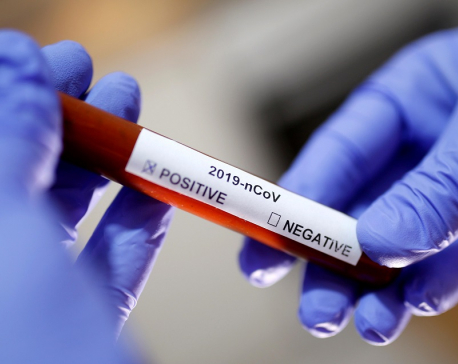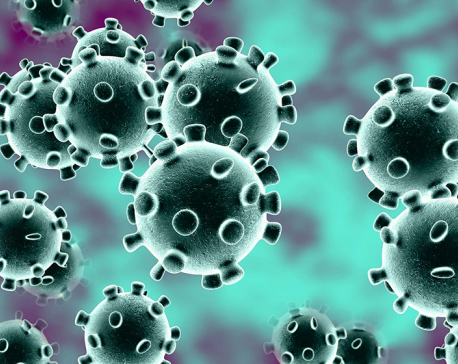
OR
#Nepal’s race to procure COVID-19 vaccine
Nepal plans to immunize 72 percent of population with corona vaccine within two years
Published On: November 23, 2020 12:39 PM NPT By: SHREE RAM SUBEDI

KATHMANDU, November 23: As Nepal's COVID-19 test positivity rate hovers around 20 percent, the World Health Organization (WHO) officials are deeply concerned, saying that many more active cases are being left out.
"A high test positivity rate can indicate that we are missing many cases," Dr Sudhir Khanal, technical officer, Immunization and Vaccine Development at WHO Regional Office for South-East Asia, New Delhi, said.
On Sunday, a total of 8,032 RT PCR test were done, of which 1,669 were found to be positive, a positivity rate of 20.7 percent. The positivity rate has been around 20 percent for the last few days.
Dr. Khanal added that the rate alone is insufficient to inform policy changes and must be considered alongside other criteria such as number of tests, the rate of testing, the testing strategy, contact tracing, and health system capacity.
In order to lift public health and social measures like lockdown in certain areas, the WHO guidelines on testing criteria seeks that no more than five percent of samples should be positive, at least for two weeks, assuming that surveillance of suspected cases is comprehensive. Also, the WHO Standard Comprehensive Surveillance and Testing of suspect cases is taken to be in the order of 1 person per 1000 population per week.
"In certain areas or clusters, where the positivity rate is more than 5 percent, micro planning is necessary to control the epidemic," he suggested.
As the general public are eagerly waiting for the arrival of the COVID-19 vaccine, another senior WHO official has advised for preventive measures at least for one year.
"Face mask use, physical distancing and frequent hand washing will be advised for at least a year," Dr Gyanendra Gongal, Regional Advisor, WHO Regional Office for South East Asia, said.
Referring to the much awaited approval of the COVID-19 vaccine anytime soon, he said, "COVID-19 vaccine is not a replacement for surveillance, contact tracing and non-pharmacological interventions --that includes physical distancing, using face mask and frequent hand washing."
The rapid global response to developing vaccine candidates has been a profound demonstration of governments, industry, and the scientific community coming together to confront a common crisis, he said, "Never in history has vaccine research progressed so quickly."
Currently more than 210 candidate vaccines are at some stage of development. At least 48 candidate vaccines are undergoing human trials. About 10 are in third phase trials.
In their interim results, three competing vaccines have claimed that they were over 90 percent effective. The US-based Moderna has claimed that the vaccine was 94.5 percent effective while another US-German collaboration vaccine made by Pfizer has claimed to be 94 percent effective. The Russian Sputnik-V vaccine claimed that it was 90 percent effective in containing the virus.
"We need to see how long the protection will last, and how well different sub-populations (elderly population, children, pregnant women, immuno-compromised population) respond to the vaccine," said Dr Gongal.
Stating that a stand-alone mode would not work in containing the deadly virus, he added, "We all have to be responsible in fighting against COVID-19 and there should be collaborative effort," said Dr Gongal.
Nepal's effort to immunize
According to Dr Khanal, as a part of the vaccination plan Nepal is seeking to immunize 72 percent of the population with COVID-19 vaccine in the next two years, beginning with three percent of the population that includes frontline workers in health and social care settings. Also, another 17 percent of the population above 55 years of age and with co-morbidity (40-54 years), and migrant labor with co-morbidity are the next prioritized target group. Children and adolescents upto 14 years of age are not covered in the vaccination plan.
Until Sunday, a total of 1,321 people have died due to COVID-19 in Nepal with 19, 963 active cases. The fatality rate is 0.6 percent.
The COVAX Facility
The COVAX Facility is the global mechanism to source COVID-19 vaccines. The Facility is seeking to make investments across a broad portfolio of selected promising vaccine candidates. By pooling purchasing power from all participating countries, the initiative aims to rapidly access doses of safe and effective vaccines as soon as they receive regulatory approval.With its allocation framework, the Facility aims to equitably distribute these doses to help protect the most at risk groups in all participating countries.
The Facility has so far signed a deal with the Serum Institute India (SII) to provide doses of vaccines for low and middle income countries including Nepal. Also, the Facility has signed a MoU with AustraZeneca in June and Statement of Intent with Sanofi/GSK in October, 2020.
"Additional candidates are expected to be brought into the COVAX Facility portfolio through newly established processes, including the UNICEF and the Pan American Health Organization(PAHO) initiatives," added Dr Khanal.
Nepal's preparedness
Nepal has formed two high level committees in relation to COVID-19 vaccine. One team comprises secretaries of ministries of Health, Finance and Foreign ministry, with its mandate to look after resource mobilization and legal clearances for emergency vaccine import and deployment. A COVID-19 vaccine advisory group of Experts (COVAC-Ex) for preparing vaccine deployment plan. The WHO and UNICEF are permanent members in the group while the World Bank is likely to join soon. Also, an ordinance has been issued for legislative clearance for the emergency import of vaccine last week. The COVAC-Ex working group is currently working on vaccine and logistic components of the deployment plan for COVID-19 vaccine. The MOHP has finalized resource mobilization plans with target populations in line with COVAX and the WHO's Strategic Advisory Group of Experts on Immunization (SAGE) guidance.
The chief specialist at the Ministry of Health and Population (MoHP), Dr Roshan Pokharel, hopes that the first lot of the vaccine will arrive in the next 3/4 months.
"We are working hard to bring vaccines to Nepal as they are provided emergency use authorization. A limited vaccine dose might be available by March next year," added Dr Pokharel.
You May Like This

Fifth Nepali succumbs to COVID-19 infection in the United Kingdom
LONDON, April 9: Nottingham-based Shiva Shrestha succumbed to COVID-19 infection on Wednesday, becoming the fifth Non-resident Nepali to die of... Read More...

Here are 10 things you can do to prevent COVID-19
KATHMANDU, March 6: The novel coronavirus is continuing its spread in many countries around the world. Amid coronavirus outbreak, the... Read More...

Ebola outbreak deaths top 1,000 in Congo amid clinic attacks
CONGO, May 4: More than 1,000 people have died from Ebola in eastern Congo since August, the country’s health minister... Read More...





Just In
- CM Kandel requests Finance Minister Pun to put Karnali province in priority in upcoming budget
- Australia reduces TR visa age limit and duration as it implements stricter regulations for foreign students
- Govt aims to surpass Rs 10 trillion GDP mark in next five years
- Govt appoints 77 Liaison Officers for mountain climbing management for spring season
- EC decides to permit public vehicles to operate freely on day of by-election
- Fugitive arrested after 26 years
- Indian Potash Ltd secures contract to bring 30,000 tons of urea within 107 days
- CAN adds four players to squad for T20 series against West Indies 'A'













Leave A Comment